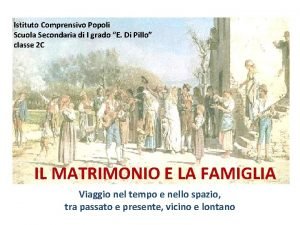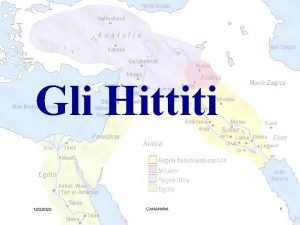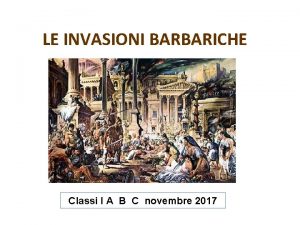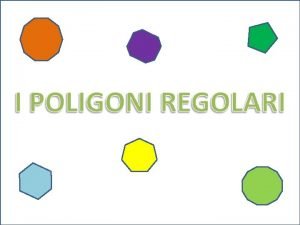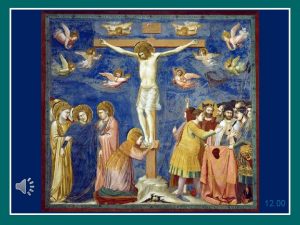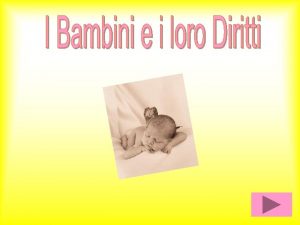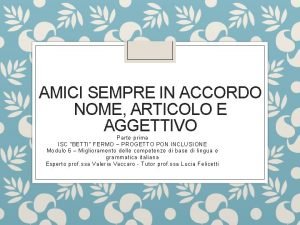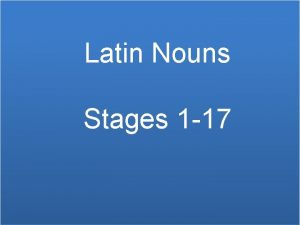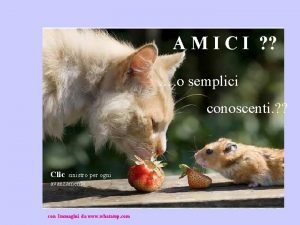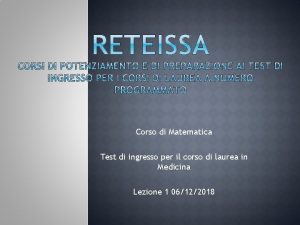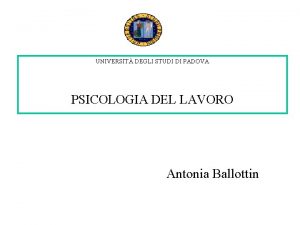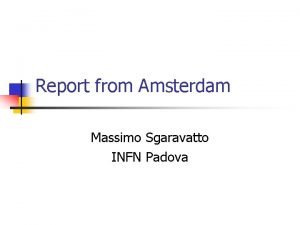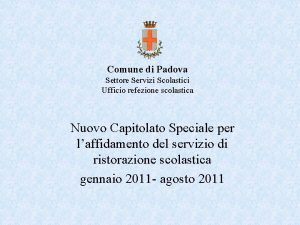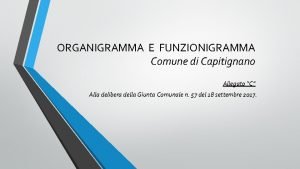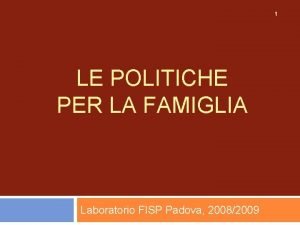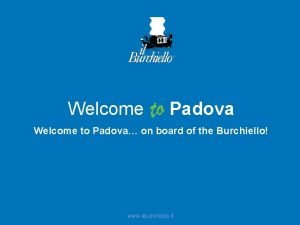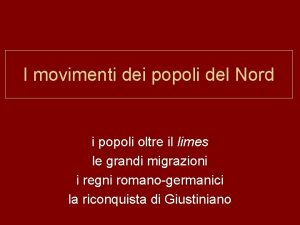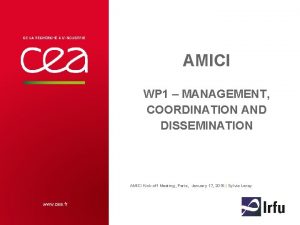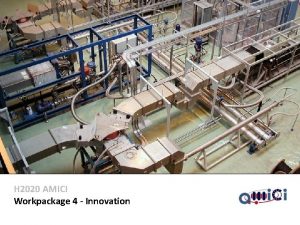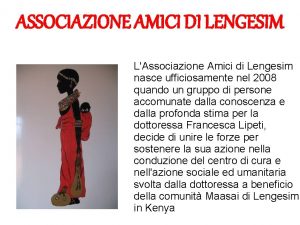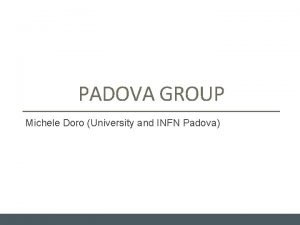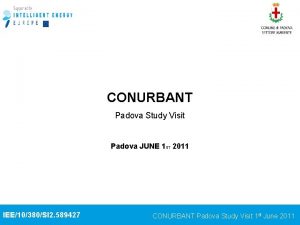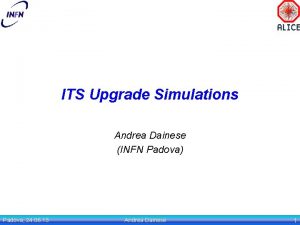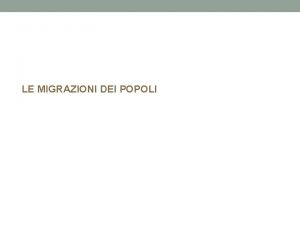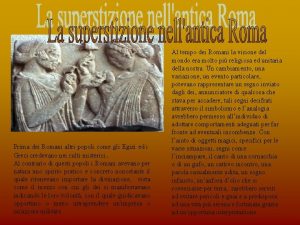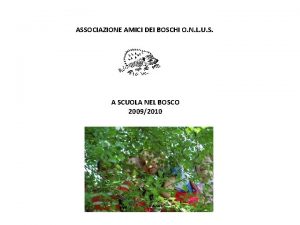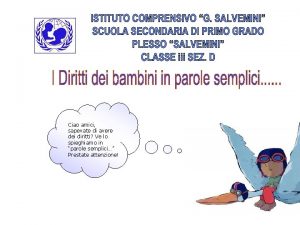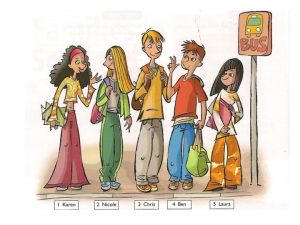Amici dei Popoli Padova Who are we Amici





















- Slides: 21

Amici dei Popoli Padova: Who are we? Ø Amici dei Popoli Padova was founded in 1983 as a local section of Amici dei Popoli NGO, based in Bologna which is an association engaged in international volunteering. Ø We are a group of people who want to overcome prejudice, prevent discrimination and fight social inequalities through local, concrete actions. Ø We are located in «Arcella» , a neighbourhood of Padova where foreign residents make up 31, 78% (2019) of the population. We promote intercultural values and activities to fulfill the needs of our community.

Amici dei Popoli Padova: What do we do? EXTRA-CURRICULAR ACTIVITIES: Ø Supporting foreign children’s integration, Italian language fluency, educational attainment levels and self esteem by offering help with homework, socialization and mentoring. WITH SCHOOLS: Ø Courses of global citizenship education; Ø Digital education and tackling hate speech courses; Ø Courses promoting gender equality FOR VOLUNTEERS: Ø Training courses on global dynamics and intercultural education (Percorso di Formazione alla Mondialità & Strumenti per l’intercultura); Ø National and Regional Civil Service (in Italy and abroad) DEVELOPMENT COOPERATION: Ø Supporting development projects in the Africa and Latin America.

Amici dei Popoli Padova Projects: Made in digital Ø A project funded by Regione Veneto to complement their educational offer in secondary schools. Ø SDG’s: Made in digital will teach how new digital technologies can support the achievement of Sustainable Development Goals (SDG’s) related to migration, gender equality, tackling hate-speech and climate change. Ø Technologies & Training: students will learn to find information, think critically while using technology and express their creativity. The project will train teachers in using new tech skills and allow them to use technology more independently. https: //www. amicideipopolipadova. it/attivita/edu cazione-allo-sviluppo/made-in-digital-lagenda 2030 -nellera-delle-nuove-tecnologie/ RESULTS: Ø 9 SCHOOLS (2019/2020) …work in progress!

Amici dei Popoli Padova Projects: Start the Change! Ø A Amici dei Popoli NGO project, co-funded by the European Commission. It aims to raise European citizens’ awareness of the importance of a joint effort to contribute to ending poverty, protecting the planet and ensuring peace and prosperity for all, as stated in the Sustainable Development Goals. Ø Education: Start the Change! proposes a replicable educational model to increase the engagement of students and young people within their communities. The project aims to strengthen networks among schools, organizations and local authorities. Ø Citizenship: The proposed “citizenship paths” invite young people aged 15 to 24 to explore the reality in which they live and reflect on the relationship between migration and global inequality. Ø https: //www. startthechange. eu/ RESULTS: Ø 10 SCHOOLS Ø 226 STUDENTS

Amici dei Popoli Padova Projects: Generiamo Una Nuova Italia Ø A F. O. C. S. I. V. project, funded by the Italian Ministry of Labour and Social Policies. Ø Integration & Hospitality: the project aims to promote equality, justice and an inclusive society. It will empower young second generation migrants by increasing cooperation between schools, local institutions and potential future employers. Ø Network: Development of the cooperation between civil society organizations offering services for migrants. This should lead to more hospitality, integration, volunteering and international solidarity. Ø http: //generiamounanuovaitalia. it/ RESULTS: Ø 6 SCHOOLS Ø 144 STUDENTS

2 - Local Activities ØItalian language courses for adult women (Basic level: A 1 - A 2) ØItalian language courses for children

Italian Language Courses 3 important elements: ØWomen ØAdults ØMigrants

Gender Ø A lot of these students have been living in Italy for a long time, sometimes years. These years are often spent in isolation: while their husbands and children integrate through their job or schooling, women tend to subordinate their needs to those of the family. Ø It is important for the class space to be a completely female space, a sort of time for themselves where to network with other women. “In these 2 hours of italian course, all problems and difficulties go away!” A. In this female space it is possible to deal with specific topics, such as body, maternity, family relationships, etc. , all subjects which would be difficult to discuss with a male presence.

Adults ØAdult students are goal-oriented and know what they want or don’t want to learn. ØAdult learning is concrete and functional in daily life and comes from concrete needs, leading to strong personal motivation. ØIt’s important to adapt to students’ needs ØThe desire to learn Italian is also connected to the will to reclaim their parental role by being able to support their kids with homework

Migrants ØIn the same class we can have people coming from a lot of different countries such as Senegal, Togo, Nigeria, Morocco, Algeria, Afghanistan, Bangladesh, Macedonia, Albania, Syria, Vietnam, etc. ØThat means multiethnic and multilingual classes ØDifferent cultural background, different concept of time and different way to act ØThe goal is to transform this into a space of inclusion

Our classes: ØDuring the morning Ø 2 times a week ØIn presence or on-line ØNursery service

Methods and instruments: ØInteractive lessons ØReal-life examples ØRole play ØStart with what students like ØUse body and hands to learn ØExchange of experiences between students and teacher ØGive space and value to all students and cultures ØField trips

Partecipative classes

Goals ØBasic language learning ØFacilitating the relation between mothers and school services ØCreating a network between women which they can rely on outside of class ØSupporting students in getting to know the territorial context, services and opportunities foreign residents

Field trips. .

Create a team. .

Italian language courses for children ØWe create a space foreign children to learn Italian to support their integration in school and outside. ØWe offer this course for primary and middle school students. ØClasses take place outside of normal school hours, either on school premises or in other spaces (e. g. the local Parish) ØWe help kids during the entire school year

Italian language courses for children- online ØDuring the pandemic, activities have been adapted to remote learning ØChildren have been supported through different online instruments (Platforms, calls, digital App) ØChildren continued to do their homework, with the support of our volunteers

Network ØWe have a strong connection with schools and families in our neighborhood. Potential students are usually identified by their teachers. ØOur dedicated volunteeers do very important work. They are specifically trained to work with foreign children.

Methodologies ØPlayful learning ØMentoring ( mentor and mentee) ØPeer education ØCooperative learning ØNon-judgmental educational environment

Goals ØLearning Italian in friendly atmosphere ØBonding between children ØConnecting schools, families and the local community ØPromoting intercultural topics and involving citizens in local actions
 Amici dei popoli padova
Amici dei popoli padova Insidan region jh
Insidan region jh Tre popoli una guerra
Tre popoli una guerra Istituto comprensivo popoli
Istituto comprensivo popoli Cananam
Cananam Costumi dei germani
Costumi dei germani Poligono regolare definizione
Poligono regolare definizione Agnus dei qui tollis peccata mundi miserere nobis
Agnus dei qui tollis peccata mundi miserere nobis Marcia dei diritti testo
Marcia dei diritti testo Aggettivi qualificativi amico
Aggettivi qualificativi amico Amicus latin declension
Amicus latin declension Amici o conoscenti
Amici o conoscenti Un soggetto abituato a bere un quarto di vino al giorno
Un soggetto abituato a bere un quarto di vino al giorno è tanto bello essere amici giocare insieme sentirsi felici
è tanto bello essere amici giocare insieme sentirsi felici Psicologia del lavoro padova
Psicologia del lavoro padova Infn padova
Infn padova Servizi scolastici padova
Servizi scolastici padova Organigramma comune di padova
Organigramma comune di padova Inaf padova
Inaf padova Fisp padova
Fisp padova Scuola primaria mantegna padova
Scuola primaria mantegna padova Burchiello padova
Burchiello padova



